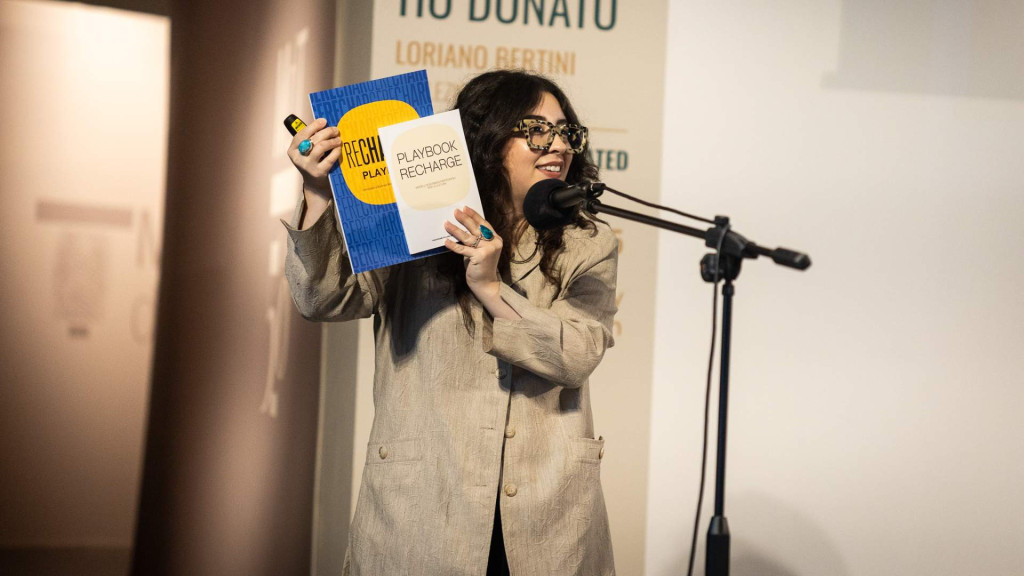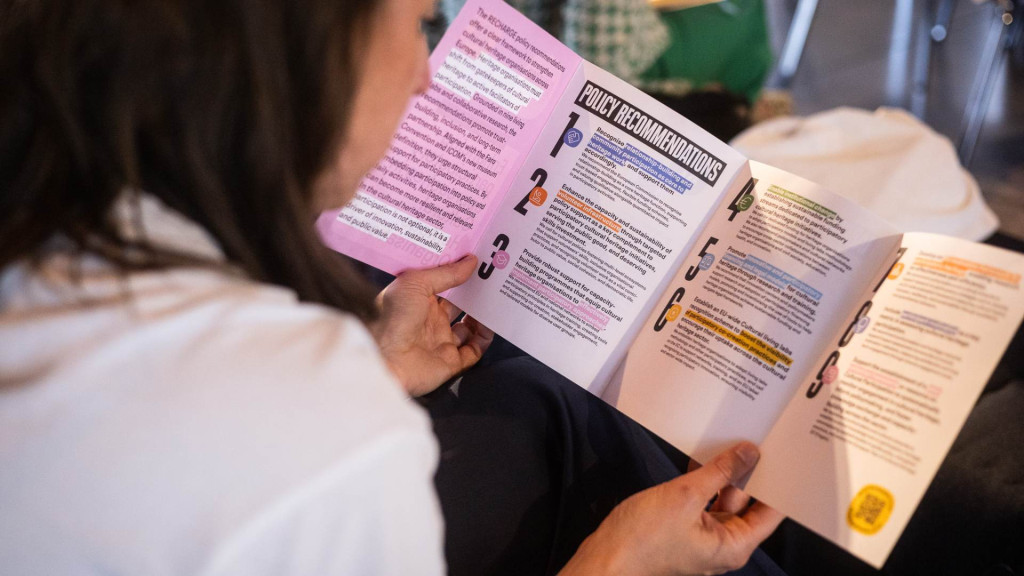The Future of Heritage Is Participatory
Cultural heritage is evolving. The RECHARGE project has shown how participatory business models can help organisations across Europe become more sustainable, inclusive, and community-driven. As a project partner, Sound & Vision plays an important role in shaping and sharing this knowledge. After three years of collaboration, experimentation, and dialogue, RECHARGE concluded in Prato, Italy, celebrating achievements and presenting tools like the RECHARGE Playbook and Knowledge Base to inspire the sector.
Cultural heritage is evolving. The RECHARGE project has shown how participatory business models can help organisations across Europe become more sustainable, inclusive, and community-driven. As a project partner, Sound & Vision plays an important role in shaping and sharing this knowledge. After three years of collaboration, experimentation, and dialogue, RECHARGE concluded in Prato, Italy, celebrating achievements and presenting tools like the RECHARGE Playbook and Knowledge Base to inspire the sector.

Creating Culture with the Community
Across Europe, cultural heritage organisations face a crucial challenge: how to engage communities meaningfully while building financially sustainable, resilient models for the long term.
The RECHARGE project, funded by the Horizon Europe programme and coordinated by Erasmus University Rotterdam, brought together ten partners with diverse expertise to reimagine how organisations engage with their communities: not only providing access to collections, but fostering co-creation, shared decision-making, and even co-ownership of cultural heritage.
As a partner, Sound & Vision has played a role in researching good practices to form impactful partnerships and collaborations, and by leading capacity-building activities that help transfer research results to other cultural institutions. Building on these learnings through nine Living Labs —dynamic spaces where ideas and solutions are co-created, tested, and iterated by collaborating stakeholders— RECHARGE has developed a collection of practical tools and fresh perspectives to help shape a more resilient and connected sector.

The Playbook Unpacked: Real Experiences from the Living Labs
One of the highlights of the final event in Prato was a session dedicated to unpacking the RECHARGE Playbook, a practical guide designed to ensure that participation in culture is not only meaningful, but financially sustainable. The session invited representatives from each RECHARGE NEXT Living Lab (six Living Labs funded by the RECHARGE project) to reflect on their journeys, challenges, and transformations.
Serfenta described how their craft revitalisation model evolved into the Heritage Impact! Initiative —a platform using culture to drive innovation and community growth— including the challenges of scaling from a specific project into a broader, financially independent model.
The Pinacoteca e Museo Civico di Volterra spoke about the shift in how they viewed their communities from passive beneficiaries to active co-creators and even co-owners, with strengthened loyalty and more formalised relationships.
Museum of Modern and Contemporary Art of Trento and Rovereto (MART) reflected on learning new practices of active listening and ethical design, taking responsibility for the social, cultural, and environmental impacts of their work.
The Hilversum Time Machine outlined the challenges of operating without formal organisational structures and the importance of local stakeholders in helping to shape their overall identity as an organisation.
The KÖME - Association of Cultural Heritage Managers, completely reshaped their understanding of key performance indicators (KPIs). Looking at them not as abstract numbers, but as measures of networks and relationships. Their methods included creative tools like a ‘Diary of Support’ and a ‘Library of Things’ to track community contributions and connections.
Museum of Architecture and Design (MAO) shared how design-thinking tools enabled a transformative approach to community involvement. They highlighted that participatory work is not always the “safe” option, but mistakes and risks are essential to building reciprocal, long-term relationships.
The living lab experiences showed that, despite the challenges, investing in participatory approaches fosters organisational growth, creates stronger, more resilient bonds with the communities they serve, and provides clear insights into how the playbook’s approaches can be applied and adapted in other organisational contexts.
The RECHARGE Knowledge Base: a long-term resource
The session also introduced the RECHARGE Knowledge Base, an online repository that brings together a wide range of resources developed throughout the RECHARGE project, with the RECHARGE Playbook at its core. Each additional resource is designed to deepen and enrich understanding of the concepts outlined in the Playbook and includes: presentations and interactive activities, research documents, videos, policy recommendations, and a collection of case studies sharing ‘Real Stories’ from the Living Labs and other cultural heritage organisations across Europe.
Together, these materials form a comprehensive toolkit that empowers cultural heritage professionals to put participatory practices into action, adapt tools to their unique context, and build more sustainable, socially responsible organisations.
The RECHARGE Knowledge Base is hosted on the RECHARGE website and will be accessible for the next ten years via the Heritage Research Hub, ensuring that the tools and knowledge developed throughout the project remain widely available well beyond its duration.
Why Does it Matter
For cultural heritage professionals, the RECHARGE outcomes provide more than inspiration. They deliver tested strategies and concrete resources to support sustainability and relevance. For policymakers and networks, the project offers evidence-based insights that can guide resource allocation, advocacy, and regulatory frameworks. For communities, it means cultural heritage that is more participatory, inclusive, and responsive to real needs.
And specifically for Sound & Vision, participating in the RECHARGE project has provided actionable insights into integrating participatory business models within our own operations. By engaging with the Living Labs, we've gained practical experience in co-creation and community engagement, which are now informing our approach to developing more inclusive and sustainable models for our media heritage initiatives.
The Future of Heritage Is Participatory
The future of cultural heritage is participatory. You can help shape it. Visit the RECHARGE Knowledge Base to explore the full Playbook, access case studies and tools, and discover policy recommendations for your organisation. Share these insights, start conversations, and advocate with policymakers across Europe to ensure cultural heritage becomes more inclusive, sustainable, and resilient.


